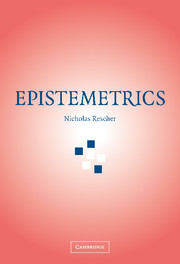Book contents
- Frontmatter
- Contents
- Preface
- 1 Asking for More Than Truth: Duhem's Law of Cognitive Complementarity
- 2 Kant's Conception of Knowledge as Systematized Information
- 3 Spencer's Law of Cognitive Development
- 4 Gibbon's Law of Logarithmic Returns
- 5 Adams's Thesis on Exponential Growth
- 6 Quality Retardation
- 7 How Much Can Be Known? A Leibnizian Perspective on the Quantitative Discrepancy Between Linguistic Truth and Objective Fact
- 8 On the Limits of Knowledge: A Kantian Perspective on Cognitive Finitude
- Conclusion
- Bibliography
- Index of Names
8 - On the Limits of Knowledge: A Kantian Perspective on Cognitive Finitude
Published online by Cambridge University Press: 06 August 2009
- Frontmatter
- Contents
- Preface
- 1 Asking for More Than Truth: Duhem's Law of Cognitive Complementarity
- 2 Kant's Conception of Knowledge as Systematized Information
- 3 Spencer's Law of Cognitive Development
- 4 Gibbon's Law of Logarithmic Returns
- 5 Adams's Thesis on Exponential Growth
- 6 Quality Retardation
- 7 How Much Can Be Known? A Leibnizian Perspective on the Quantitative Discrepancy Between Linguistic Truth and Objective Fact
- 8 On the Limits of Knowledge: A Kantian Perspective on Cognitive Finitude
- Conclusion
- Bibliography
- Index of Names
Summary
(1) It is in principle impossible ever to give an example of an unknowable fact. (2) While universalizations do enable us to assert truths about nonsurveyable totalities, such totalities nevertheless serve to demarcate us as cognitively finite beings. (3) For general facts regarding an open-ended group will – when contingent and not law-inherent – open the door to facts that are beyond the cognitive grasp of finite knowledge. (4) Nevertheless, as Kant insightfully saw it, the realm of knowledge – of ascertainable fact – while indeed limited, is nevertheless unbounded.
Limits of Knowledge
The cognitive beings that will concern us here are language-dependent finite intelligences. These by their very nature are bound to be imperfect knowers. For the factual information at their disposal by way of propositional knowledge that something or other is the case will – unlike practical how-to knowledge – have to be verbally formulated. And language-encompassed textuality is – as we have seen – outdistanced by the facts themselves. Just what is one to make of the numerical disparity between facts and truths, between what is knowable in theory and what our finite intelligences can actually manage to know? Just what does this disproportion portend?
It means that our knowledge of fact is incomplete – and inevitably so! – because we finite intelligences lack the means for reality's comprehensive characterization. Reality in all its blooming buzzing complexity is too rich for faithful representation by the recursive and enumerable resources of our language.
- Type
- Chapter
- Information
- Epistemetrics , pp. 95 - 104Publisher: Cambridge University PressPrint publication year: 2006



